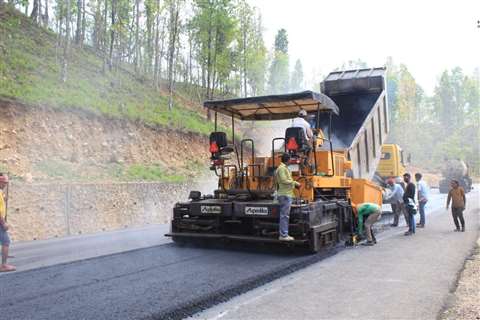Road project in Nepal presents unique obstacles for equipment
23 June 2020

The Dharan-Chatara road project, situated in the Himalayan mountain range in Nepal, presents numerous unique challenges for the asphalt mixing plants and roadbuilding machines being used.
Located near Mount Everest, the highest point on Earth, the project consists of a 115-km stretch connecting Province 1 and Province 3 in Nepal. The road is treacherous, with altitudes up to 2400 metres and grades as steep as 9 degrees.
The task was to upgrade and expand an existing road to 11 metres in width, enabling three lanes of traffic. The steepest areas had a grade of 14 degrees, which was brought down to a maximum grade of 9 degrees during the rebuilding phase.
Handling this five-year assignment is Kalika Construction Pvt. Ltd., founded in 1976. The Dharan-Chatara connection is the first highway undertaking designed by Nepali engineers and executed by a Nepali contractor.
In addition to the challenges already mentioned, ambient temperatures in the region limit daily paving and make the work difficult for the crew, according to reports. To further complicate the situation, paving can only occur during the summer months.
Roadbuilding is never without challenges, but fortunately today’s technology is taking projects in new directions in terms of the material used and the method of its delivery; the equipment in operation and the operator experience; the speed, efficiency and sustainability of construction and rehabilitation processes.
An Ammann Apollo ANP 1000 asphalt mixing plant and an Apollo DrumMix 120 parallel-flow plant have been able to keep pace with the paving crew to deliver quality results, according to the manufacturer, noting the machines are able to make mix at higher-than-normal temperatures so the material is properly heated when it arrives on the jobsite.

Once there, an Apollo AP 550 hydrostatic sensor paver and a WM 6 HES mechanical paver finisher place the materials to pave on steep grades.
“These machines are able to negotiate the difficult gradient,” Padam Gurung, director of Kalika, says. “The pavers need to be powerful, and these are.”
The pavers are required to pull large amounts of material – a base course is placed at a depth of 440 mm, which is a considerable weight given the depth, altitude and grade. A surface course of 60 mm is also placed.
It is a difficult project, but Gurung says Kalika Construction is meeting the challenge with its experience building roads, highways, bridges, water supply infrastructure, hydropower systems, electrical transmission foundations, tunnels and industrial complexes.
Ammann dealer Auto Electro Mech Pvt Ltd. (AEMPL) provided after-sales support to Kalika, ensuring all machines on the project were properly serviced and maintained for maximum uptime.
“Reliability of the machines is one of the major concerns of our management,” Gurung says. “This ensures us the work continues uninterrupted. Also essential is good after-sales service and high machine quality that provides durability and top performance.”
STAY CONNECTED



Receive the information you need when you need it through our world-leading magazines, newsletters and daily briefings.
CONNECT WITH THE TEAM







